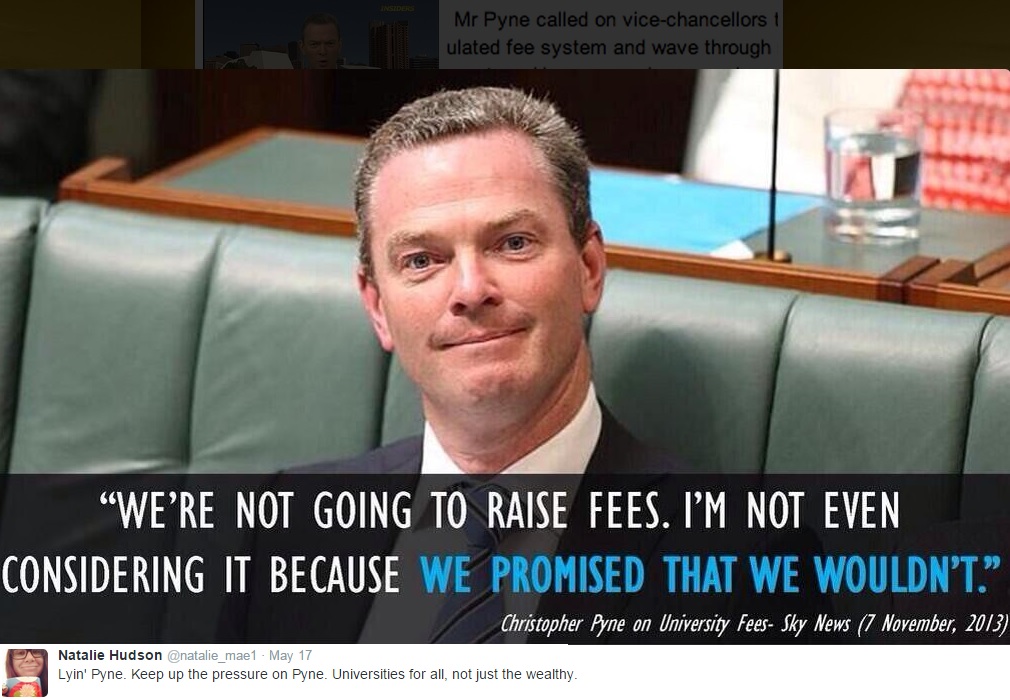Deregulating university fees will penalise students with learning disorders, increase inequality and send Australia backwards as a nation, writes Tim Lubcke.
On the way to work this morning, as I write this, I heard Christopher Pyne again defending the deregulation of university fees on ABC local radio. I had to switch stations. It seems to me that those in favour of it have lived a fairly benign existence and are honestly unable to see how much they risk undermining further Australian prosperity.
I know what it’s like to come at education with an irregular brain.
I was perhaps six or seven when a teacher slid the piece of paper in front of me. It was the first test of my schooling life.
When he told us to turn over the page and begin, what would dominate the next 15 years of my life came crashing home. The page was unintelligible. I just didn’t get what was being asked of me. It was like being handed a foreign language with everyone around you expecting you to understand it.
I panicked and after some time, broke down. More than two-and-a-half decades later, I still vividly remember that moment.
Dictation was by far the most difficult task I experienced over those early years, however it wasn’t isolated to one subject. Year after year teachers lamented to my parents about my “stubbornness” in class and refusal to learn. One teacher said it looked as though I wrote with my feet.
If it wasn’t for the sanctuary of the private world of my bedroom, I would have believed that I was stupid, as I was being told in school. At least in that one place – and the support of my parents with text books and equipment – I could learn about the natural world, and play with electronics and basic mechanics.
From that, I knew that I was able, but needed to learn by myself.
By the time I looked towards tertiary education, in my early 20’s, an astute teacher recognised the traits of dyslexia. She insisted that I was tested, which confirmed as much. While some suggestions came of it ‒ such as using computers rather than hand writing ‒ the central point was that I had learnt how to learn for myself.
Successfully landing a place in a degree in environmental science, I was not a great student. In the first couple of years, I passed with the occasional credit. Yet when I was given autonomy in my final year of the courses, that’s when I began to prove my value.
Dyslexia is nothing more than a story of a square peg and around hole. When I was able to define my working style, I could flourish.
Since the completion of my degree, I’ve gone on to demonstrate my value.
Although I completed a degree focused on ecology, I quickly moved towards data management, and technical project development and maintenance. I’ve designed a number of automated data validation and analysis packages, project databases, websites, remote research facilities and portable chemistry devices.
Again, it has been in those roles where I have been granted autonomy that I’ve added the most value in environmental research.
The discussions regarding the deregulation of university fees, however, I recognised would have stopped me entirely from pursuing this path.
'Far-fetched': “@ABCFactCheck:verdict on Education Minister @cpyne's university reforms claim http://t.co/RVYIW7pdGO pic.twitter.com/1hvhZBWJ7U”
— Merilyn Childs (@MerilynChilds) September 22, 2014
Schooling has been hard and completely unenjoyable from start to finish in my case. I went on because I saw the value to my career. That value would be lost if I had acquired debt that I would live with for decades; seven years on, I have just under half of my HECS debt remaining as it is.
I’ve also heard talk in interviews from senior figures of various universities suggesting that deregulated university fees would allow them to provide a range of scholarships to students from humble backgrounds. That sounds nice, but I know that an unremarkable dyslexic student such as I was would be extremely unlikely to receive this particular boost.
I come from a working class family, where I am the only one to have even completed secondary education. I am very conscious of debt and how debilitating it can be.
I can confidently say that I would not be where I am today if Howard deregulated university at the turn of the century prior to my application to my course.
Earlier this year, I wrote about the failing green sector — something that has led me to contemplate my career path and indeed the possibility of completing another degree to move into a more secure career. Yet, I am unwilling to start something that might grow in exponential cost as I go further along the course. Uncertainty has left me in limbo.
Deregulation of university fees strips the Aussie fair go from education and I feel for my children, who would be stuck with very difficult choices as young adults.
The value of a candidate is impossible to define on purely academic measures, as I hope my career thus far illustrates. Moreover, with the recent passing of Gough Whitlam, we are reminded just how much it changed the lives of Australian’s (especially women) in opening the doors to universities in the 1970’s through free education.
Debt is debt and the most responsible students will be wary to take on too much of it. We risk generations of hardworking, diligent students avoiding such debt and in turn, growing skills shortage which inevitably will take us backwards as a nation.

This work is licensed under a Creative Commons Attribution-NonCommercial-NoDerivs 3.0 Australia License
Monthly Donation
Single Donation
Memo to @C_Pyne_MP
FYI:"Govt's plan to deregulate universities is 'a crime'"-Stiglitz
http://t.co/prOinrilJ0 #auspol pic.twitter.com/kVJaaXW3DS
— You Bet You Am! (@johndory49) July 3, 2014
Nobel Prize-winning economist Joseph Stiglitz, with an important message for Abbott and Pyne on universities! #auspol pic.twitter.com/D94h4mrSCr
— Stephen (@TheAviator1992) July 3, 2014








